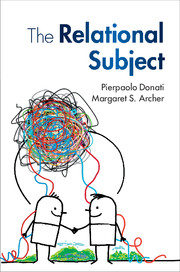Book contents
- Frontmatter
- Dedication
- Contents
- List of figures
- Acknowledgements
- Part I
- Part II
- Part III
- Prologue: The range of Relational Subjects: where and how they emerge
- 6 When Relational Subjects generate relational goods
- 7 The emergence of collective Relational Subjects and their societal impact: beyond the market/state binary code
- 8 Relational Subjects and the ravages of globalized markets: the need for subjects with relational ethics
- 9 Conclusions: Collective subjects and the added value of social relations
- Index
9 - Conclusions: Collective subjects and the added value of social relations
from Part III
Published online by Cambridge University Press: 05 July 2015
- Frontmatter
- Dedication
- Contents
- List of figures
- Acknowledgements
- Part I
- Part II
- Part III
- Prologue: The range of Relational Subjects: where and how they emerge
- 6 When Relational Subjects generate relational goods
- 7 The emergence of collective Relational Subjects and their societal impact: beyond the market/state binary code
- 8 Relational Subjects and the ravages of globalized markets: the need for subjects with relational ethics
- 9 Conclusions: Collective subjects and the added value of social relations
- Index
Summary
What are the drivers of Relational Subjects? Evaluating social relations
The Relational Subject is not only s/he who acts reflexively taking into account her/his relations with significant others, but is s/he who operates on/with/through social relations. Therefore, it becomes essential to understand how operations happen and are configured. We can translate this issue into the question: what is the role played by social relations in fostering that particular kind of sociability which constitutes the ground on which Relational Subjects can emerge?
Sociability can be defined as trust and cooperation among people who act in terms of reciprocal symbolic references and connections. Empirical research reveals that sociability is a complex factor that creates and enhances collective subjects, but social scientists are divided into two strands of thought.
According to the first strand, the enhancement of collective subjects does not need any network of social relations, or at least takes place without depending upon social networks, because what is necessary and sufficient is held to be the sharing of a common culture (e.g. civic or civil culture) among individual people. That is why collective subjects are quite often assimilated to social movements (such as the Greens or the Anti-Global movement). This simplistic assimilation should be questioned, because in many cases it could be incorrect and misleading. Social theory needs to distinguish between different kinds of social movements. On one hand, there are those movements that commence and consist in a protest and end with it (for instance, movements against the war in Vietnam or Iraq) or consist in reclaiming a right or seeking a vindication that, once obtained, is enjoyed by the individuals in their private lives (for instance, a movement that seeks the abolition of a tax or defends the existence of a public park and its use by individual citizens).
- Type
- Chapter
- Information
- The Relational Subject , pp. 301 - 331Publisher: Cambridge University PressPrint publication year: 2015

